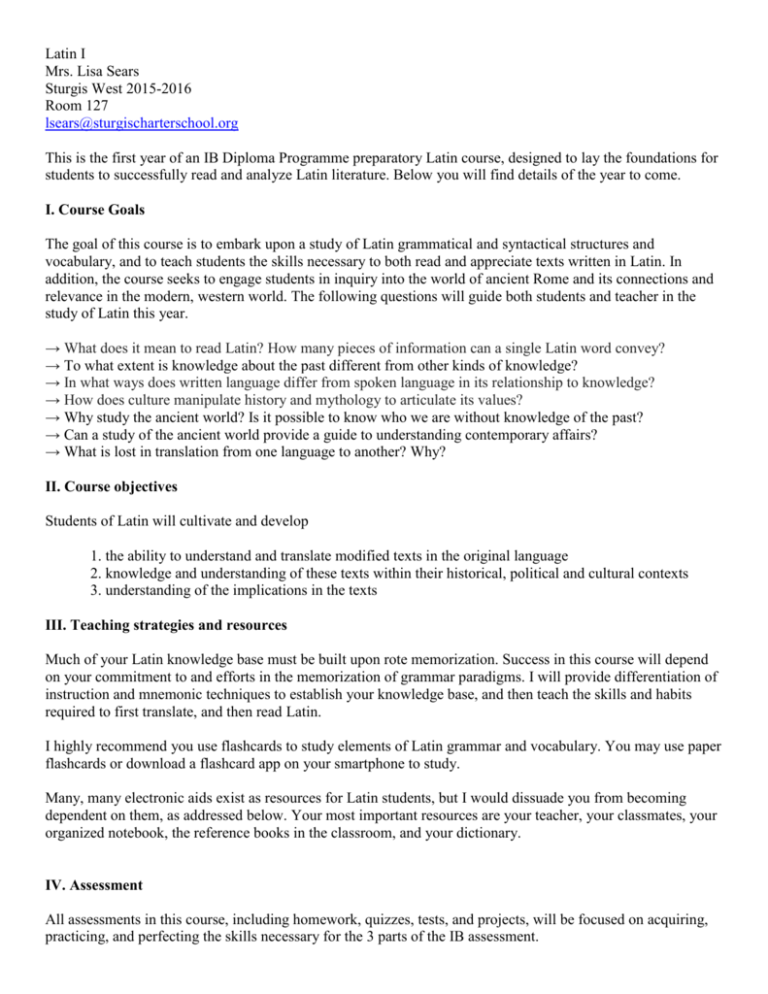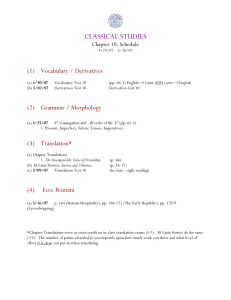Latin 1 - Sturgis Charter Public School
advertisement

Latin I Mrs. Lisa Sears Sturgis West 2015-2016 Room 127 lsears@sturgischarterschool.org This is the first year of an IB Diploma Programme preparatory Latin course, designed to lay the foundations for students to successfully read and analyze Latin literature. Below you will find details of the year to come. I. Course Goals The goal of this course is to embark upon a study of Latin grammatical and syntactical structures and vocabulary, and to teach students the skills necessary to both read and appreciate texts written in Latin. In addition, the course seeks to engage students in inquiry into the world of ancient Rome and its connections and relevance in the modern, western world. The following questions will guide both students and teacher in the study of Latin this year. → What does it mean to read Latin? How many pieces of information can a single Latin word convey? → To what extent is knowledge about the past different from other kinds of knowledge? → In what ways does written language differ from spoken language in its relationship to knowledge? → How does culture manipulate history and mythology to articulate its values? → Why study the ancient world? Is it possible to know who we are without knowledge of the past? → Can a study of the ancient world provide a guide to understanding contemporary affairs? → What is lost in translation from one language to another? Why? II. Course objectives Students of Latin will cultivate and develop 1. the ability to understand and translate modified texts in the original language 2. knowledge and understanding of these texts within their historical, political and cultural contexts 3. understanding of the implications in the texts III. Teaching strategies and resources Much of your Latin knowledge base must be built upon rote memorization. Success in this course will depend on your commitment to and efforts in the memorization of grammar paradigms. I will provide differentiation of instruction and mnemonic techniques to establish your knowledge base, and then teach the skills and habits required to first translate, and then read Latin. I highly recommend you use flashcards to study elements of Latin grammar and vocabulary. You may use paper flashcards or download a flashcard app on your smartphone to study. Many, many electronic aids exist as resources for Latin students, but I would dissuade you from becoming dependent on them, as addressed below. Your most important resources are your teacher, your classmates, your organized notebook, the reference books in the classroom, and your dictionary. IV. Assessment All assessments in this course, including homework, quizzes, tests, and projects, will be focused on acquiring, practicing, and perfecting the skills necessary for the 3 parts of the IB assessment. Part 1: Study of the language Students develop the ability to translate classical texts in the original language using a dictionary. To this end, here is much work to be done in the realms of vocabulary and grammar. Part 2: Genre study Students learn to read Latin as a literature as opposed to translate Latin as an academic exercise, and students will be able to explain the context and content of a passage. Part 3: Individual study Students examine, in detail, some aspect of classical language or civilization through an independent research project. Grading will be as follows: 1. 80%- Language study (this includes assessments of grammar, vocabulary knowledge, and translation) 2. 20%- Research project (1 per quarter) Assignments are not weighted by category but instead are assigned points. For example, a homework may be 5 points, a vocabulary quiz may be 25, and a test may be 100. In this way the importance of each assessment will be factored into your grade. You should expect homework most nights. Mostly it will consist of preparation for the following day’s class activities, including memorization of vocabulary or grammatical paradigms, or reading and studying a designated passage. Quizzes will be frequent and assess your progress in vocabulary, grammar, translation, and literary analysis. I will generally notify you a day or two in advance of a quiz. You can and should retake quizzes until you reach 100% mastery of the subject. In Latin you must learn and retain the memorized material, and to this end you may retake any quiz as many times as you need to until the end of the quarter. It is your responsibility to arrange these retakes with me, and they may not be done during class time. Tests will be cumulative and may cover any of the topics we have studied. I will notify you at least one week prior to a major test. Throughout the year, we will dedicate time both within and out of class to research projects on various topics related to the classical world. V. Materials Needed for Latin I All students MUST bring the following items to class everyday: 1) Writing utensil. A pen or pencil is necessary 2) Your Daily Planner 3) Three-ring binder dedicated to Latin class alone 4) Blank Paper 5) Collins Latin Dictionary *The Collins Latin Dictionary (ISBN: 978-0-06-053690-9) can be ordered through the Sturgis West Latin Department for an estimated cost of $12-15. More information will be provided. *The class will use Wheelock’s Latin, 7th edition (ISBN: 978-0-06-199721-1). Books are provided in the classroom ONLY. You may purchase your own for at-home use if you wish. Since the books DO NOT travel home with students, it is extremely important that you are organized in your note-taking and binders. I will hand out copies of grammar worksheets, vocabulary lists, and translation exercises and stories. It is your responsibility to keep these in a 3-ring notebook which you bring to class each day. I would suggest you organize your notebook to include 3 sections: grammar, vocabulary, and translations. VI. Expectations & Conduct You must conduct yourself in such a way that you afford due respect to all people involved in classroom learning, including yourself, your classmates, your teacher, and any others who may be present in the classroom or learning environment. Disrespectful conduct will not be tolerated. Cell phone use is not allowed. A note on web-based translation aids: you will do yourself a major disservice if you rely on websites, apps, or anything other than a paper dictionary to look up words while you do your translations. The ability to use a paper dictionary judiciously in exam conditions is necessary for paper I, and any other translation aid is merely a crutch. A note on plagiarism: this serious form of academic dishonesty is grounds for immediate failure on the assignment and further possible consequences as well. I am fully aware of the wide availability of translations of all the texts we will read. Such is the case for literature written over 2000 years ago. Your translations must be literal, in your own voice, and account for all words and grammatical constructions within the passage. These translations will rarely sound “good” in English. We will deal with this problem of “translation-ese” over and over in this class. Just as I expect the above from you, you must expect timely, meaningful feedback from me regarding your work. I will return your work within 7 school days of its due date, if not sooner, with written quantitative or qualitative feedback, as is appropriate. I will provide you with feedback during class and when you come for extra help. Extra Help I am available during periods A and F, and after school on Tuesdays to work with you on concepts or practice. I am also available during break and lunch.







